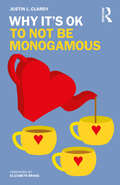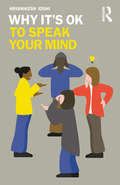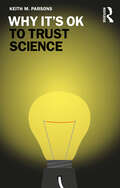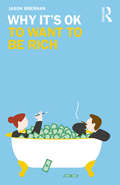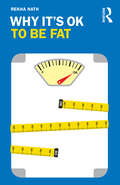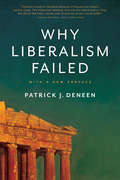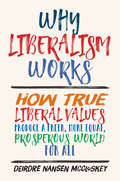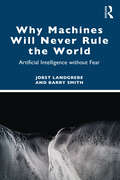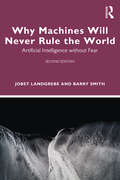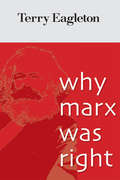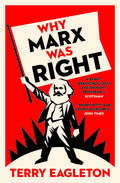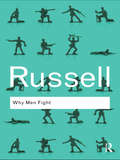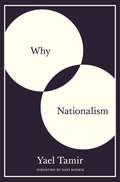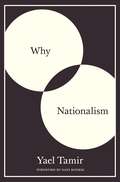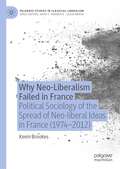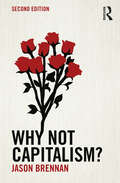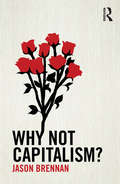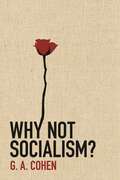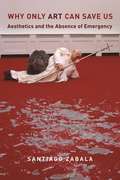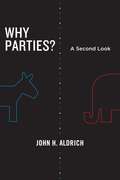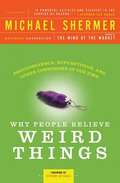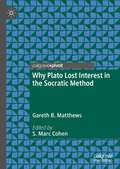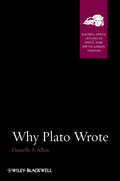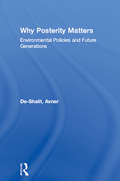- Table View
- List View
Why It's OK to Not Be Monogamous (Why It's OK)
by Justin L. ClardyThe downsides of monogamy are felt by most people engaged in long-term relationships, including restrictions on self-discovery, limits on friendship, sexual boredom, and a circumscribed understanding of intimacy. Yet, a "happily ever after" monogamy is assumed to be the ideal form of romantic love in many modern societies: a relationship that is morally ideal and will bring the most happiness to its two partners. In Why It’s OK to Not Be Monogamous, Justin L. Clardy deeply questions these assumptions. He rejects the claim that non-monogamy among honest, informed and consenting adults is morally impermissible. He shows instead how polyamorous relationships can actually be exemplars of moral virtue. The book discusses how social and political forces sustain and reward monogamous relationships. The book defines non-monogamy as a privative concept; a negation of monogamy. Looking at its prevalence in the United States, the book explains how common criticisms of non-monogamy come up short. Clardy argues, as some researchers have recently shown—monogamy relies on continually demonizing non-monogamy to sustain its moral status. Finally, the book concludes with a focus on equality, asking what justice for polyamorous individuals might look like.
Why It's OK to Own a Gun (Why It's OK)
by Ryan W. DavisWhy It’s OK to Own a Gun explores the right to self-defense, but also looks beyond it to what gun ownership fundamentally means in American life. Guns can provide a source of meaning that doesn’t depend on how much money you have or how important your job is. Guns can offer a sense of shared identity that’s not hung up on intellectual credentials or ideological orthodoxy. For many responsible gun owners, owning a gun is a way of positively reclaiming one’s own agency in the world. It’s true that guns matter to only a minority of Americans, but the same could be said for many important political liberties. Like freedom of religion and freedom of expression, guns should be on the list of basic rights. In fact, they are: as some in America’s founding generation anticipated, gun rights have offered a bulwark for republican freedom. Because there is nothing morally wrong with any of these values, owning a gun is OK. Key Features: Discusses the grounds of the political rights of gun ownership Connects the debate over guns with the sociology of gun ownership Describes genuinely worthwhile features of a way of life that’s unfamiliar to many readers Considers empirical and normative aspects of the gun debate Thinks about individual rights in the context of state power
Why It's OK to Speak Your Mind (Why It's OK)
by Hrishikesh JoshiPolitical protests, debates on college campuses, and social media tirades make it seem like everyone is speaking their minds today. Surveys, however, reveal that many people increasingly feel like they’re walking on eggshells when communicating in public. Speaking your mind can risk relationships and professional opportunities. It can alienate friends and anger colleagues. Isn’t it smarter to just put your head down and keep quiet about controversial topics? In this book, Hrishikesh Joshi offers a novel defense of speaking your mind. He explains that because we are social creatures, we never truly think alone. What we know depends on what our community knows. And by bringing our unique perspectives to bear upon public discourse, we enhance our collective ability to reach the truth on a variety of important matters. Speaking your mind is also important for your own sake. It is essential for developing your own thinking. And it’s a core aspect of being intellectually courageous and independent. Joshi argues that such independence is a crucial part of a well-lived life. The book draws from Aristotle, John Stuart Mill, Friedrich Nietzsche, Bertrand Russell, and a range of contemporary thinkers to argue that it’s OK to speak your mind. Key Features Shows that we have not just a right but a moral duty to publicly share what we know. Argues that discussing your unique ideas with others is essential for developing as a critical thinker. Explores the value of intellectual honesty and independence in the writings of John Stuart Mill and Friedrich Nietzsche and connects their thinking to contemporary problems. Argues that avoiding cultural blind spots today is important for the fate of future generations.
Why It's OK to Trust Science (Why It's OK)
by Keith M. ParsonsWhy trust science? Why should science have more authority than "other ways of knowing?" Is science merely a social construct? Or even worse: a tool of oppression? This book boldly takes on these and other explosive questions—lodged by ideologues on the left and the right—and offers readers a well researched defense of science and a polemic addressed to its detractors. Why It’s OK to Trust Science critically examines the recent history of critiques of science, including those in academia from scholars like Bruno Latour, Simon Schaffer, and Thomas Kuhn. It then presents case studies drawn from recent advances in the field of dinosaur paleontology, showing how science generates objective knowledge, even during revolutionary episodes. The book next looks at how that same objective knowledge can be gained even when researching extremely complex issues, using climate science to distinguish between genuine skepticism –upon which science depends–from dogmatic denial. The book is for anyone who needs thoughtful, razor sharp responses to the detractors of science—whether they be anti-vaxxers, climate change deniers, profit-seeking businessmen, or published relativists in the knowledge-making industries. Key Features: Highly readable and accessible without oversimplifying the complexities of scientific research Exposes the many flaws of the "undertermination thesis"—the argument that indefinitely many hypotheses are compatible with any body of evidence Explores whether moral and other value-laden questions can be answered by science Includes three appendixes online: (1) Summary of The Structure of Scientific Revolutions; (2) Rorty on Losing the World; (3) 21 Facts in Support of Human-Caused Climate Change
Why It's OK to Want to Be Rich (Why It's OK)
by Jason BrennanFinger-wagging moralizers say the love of money is the root of all evil. They assume that making a lot of money requires exploiting others, and that the best way to wash off the resulting stain is to give a lot of it away. In Why It’s OK to Want to Be Rich, Jason Brennan shows that the moralizers have it backwards. He argues that, in general, the more money you make, the more you already do for others, and that even an average wage earner is productively “giving back” to society just by doing her job. In addition, wealth liberates us to have the best chance of leading a life that’s authentically our own. Brennan also demonstrates how money-based societies create nicer, more trustworthy, and more cooperative citizens. And in another chapter that takes on the new historians of capitalism, Brennan argues that wealthy nations became wealthy because of their healthy institutions, not from their horrific histories of slavery or colonialism. While writing that the more money one has, the more one should help others, Brennan also notes that we weren’t born into a perpetual debt to society. It’s OK to get rich and it’s OK to enjoy being rich, too. --- Key Features Shows how the desire to become wealthy in an open and fair market helps maximize cooperation and lessens the chance of violence and war Argues that it is much easier for the average for-profit business to add value to the world than it is for the average non-profit Demonstrates that the kinds of virtues (e.g., conscientiousness, thoughtfulness, hard work) that lead to desirable personal and civic states (e.g., happy marriages, stable families, engaged citizens) also make people richer Argues that living in small clans for most of their history has given humans a negative attitude towards anyone acquiring more than her "fair share," an attitude that’s ill-suited for our market-driven, globally connected world In a final, provocative chapter, maintains that ideal economic growth is infinite.
Why It’s OK to Be Fat (Why It's OK)
by Rekha NathOfficially, Western societies are waging a war on obesity. Unofficially, we are waging a war on fat people. Anti-fat sentiment is pervasive, and fat people suffer a host of harms as a result: workforce discrimination, inferior medical care, relentless teasing, and internalized shame. A significant proportion of the population endures such harms. Yet, that is not typically regarded as a serious problem. Most of us aren’t quite sure: Is it really OK to be fat? This book argues that it is.In Why It’s OK to Be Fat, Rekha Nath convincingly argues that onventional views of fatness in Western societies—as a pathology to be fixed or as a moral failing—are ill-conceived. Combining careful empirical investigation with rigorous moral argumentation, this book debunks popular narratives about weight, health, and lifestyle choices that underlie the dominant cultural aversion to fatness. It argues that we should view fatness through the lens of social equality, examining the wide-ranging ways that fat individuals fail to be treated as equals. According to Nath, it is high time that we recognize sizeism—the systematic ways that our society penalizes fat individuals for their size—as a serious structural injustice, akin to racism, sexism, and homophobia.For additional online material from the author, related to this book, please see rekhanath.net
Why Liberalism Failed (Politics and Culture)
by Patrick J. DeneenHas liberalism failed because it has succeeded? Of the three dominant ideologies of the twentieth century—fascism, communism, and liberalism—only the last remains. This has created a peculiar situation in which liberalism’s proponents tend to forget that it is an ideology and not the natural end-state of human political evolution. As Patrick Deneen argues in this provocative book, liberalism is built on a foundation of contradictions: it trumpets equal rights while fostering incomparable material inequality; its legitimacy rests on consent, yet it discourages civic commitments in favor of privatism; and in its pursuit of individual autonomy, it has given rise to the most far-reaching, comprehensive state system in human history.Here, Deneen offers an astringent warning that the centripetal forces now at work on our political culture are not superficial flaws but inherent features of a system whose success is generating its own failure.
Why Liberalism Works: How True Liberal Values Produce a Freer, More Equal, Prosperous World for All
by Deirdre Nansen McCloskeyAn insightful and passionately written book explaining why a return to Enlightenment ideals is good for the world The greatest challenges facing humankind, according to Deirdre McCloskey, are poverty and tyranny, both of which hold people back. Arguing for a return to true liberal values, this engaging and accessible book develops, defends, and demonstrates how embracing the ideas first espoused by eighteenth-century philosophers like Locke, Smith, Voltaire, and Wollstonecraft is good for everyone. With her trademark wit and deep understanding, McCloskey shows how the adoption of Enlightenment ideals of liberalism has propelled the freedom and prosperity that define the quality of a full life. In her view, liberalism leads to equality, but equality does not necessarily lead to liberalism. Liberalism is an optimistic philosophy that depends on the power of rhetoric rather than coercion, and on ethics, free speech, and facts in order to thrive.
Why Machines Will Never Rule the World: Artificial Intelligence without Fear
by Barry Smith Jobst LandgrebeThe book’s core argument is that an artificial intelligence that could equal or exceed human intelligence—sometimes called artificial general intelligence (AGI)—is for mathematical reasons impossible. It offers two specific reasons for this claim: Human intelligence is a capability of a complex dynamic system—the human brain and central nervous system. Systems of this sort cannot be modelled mathematically in a way that allows them to operate inside a computer. In supporting their claim, the authors, Jobst Landgrebe and Barry Smith, marshal evidence from mathematics, physics, computer science, philosophy, linguistics, and biology, setting up their book around three central questions: What are the essential marks of human intelligence? What is it that researchers try to do when they attempt to achieve "artificial intelligence" (AI)? And why, after more than 50 years, are our most common interactions with AI, for example with our bank’s computers, still so unsatisfactory? Landgrebe and Smith show how a widespread fear about AI’s potential to bring about radical changes in the nature of human beings and in the human social order is founded on an error. There is still, as they demonstrate in a final chapter, a great deal that AI can achieve which will benefit humanity. But these benefits will be achieved without the aid of systems that are more powerful than humans, which are as impossible as AI systems that are intrinsically "evil" or able to "will" a takeover of human society.
Why Machines Will Never Rule the World: Artificial Intelligence without Fear
by Barry Smith Jobst LandgrebeThis is a revised and expanded second edition of Why Machines Will Never Rule the World. Its core argument remains the same: that an artificial intelligence (AI) that could equal or exceed human intelligence – sometimes called ‘artificial general intelligence’ (AGI) – is for mathematical reasons impossible. It offers two specific reasons for this claim: Human intelligence is a capability of the human brain and central nervous system, which is a complex dynamic system Systems of this sort cannot be modelled mathematically in a way that allows them to operate inside a computer In supporting their claim, the authors, Jobst Landgrebe and Barry Smith, marshal evidence from mathematics, physics, computer science, philosophy, linguistics, biology, and anthropology, setting up their book around three central questions: What are the essential marks of human intelligence? What is it that researchers try to do when they attempt to achieve ‘Artificial Intelligence’ (AI)? And why, after more than 50 years, are our interactions with AI, for example when on the telephone with our bank’s computers, still so unsatisfactory?The first edition was published the same week that ChatGPT was unleashed onto the world. This second edition shows how the arguments in the book apply already to Large Language Models such as ChatGPT. This new edition also brings up to date the arguments relating to the limits of AI, showing why AI systems are best viewed as pieces of mathematics, which cannot think, feel, or will. They also demolish the idea that, with the help of AI, we could ‘solve physics’ in a way that would allow us to create, in the cloud, a perfect simulation of reality in which we could enjoy digital immortality. Such ideas reveal a lack of understanding of physics, mathematics, human biology, and computers.There is still, as the authors demonstrate in an updated final chapter, a great deal that AI can achieve which will benefit humanity. But these benefits will be achieved without the aid of systems that are more powerful than humans, which are as impossible as AI systems that are intrinsically ‘evil’ or able to ‘will’ a takeover of human society.Key Changes to the Second Edition Shows how the arguments of the first edition apply also to new Large Language Models Adds a treatment of human practical intelligence – of knowing how vs. knowing that – a topic that is ignored by the AI community Demonstrates why ‘AI ethics’ should be relabelled as ‘ethics of human uses of AI’ Adds a new chapter showing the essential limitations of physics, providing a thorough grounding for the arguments of the book Demolishes the idea that we might already be living in a simulation
Why Marx Was Right
by Terry EagletonIn this combative, controversial book, Terry Eagleton takes issue with the prejudice that Marxism is dead and done with. Taking ten of the most common objections to Marxism--that it leads to political tyranny, that it reduces everything to the economic, that it is a form of historical determinism, and so on--he demonstrates in each case what a woeful travesty of Marx's own thought these assumptions are. In a world in which capitalism has been shaken to its roots by some major crises,Why Marx Was Rightis as urgent and timely as it is brave and candid. Written with Eagleton's familiar wit, humor, and clarity, it will attract an audience far beyond the confines of academia.
Why Marx Was Right
by Terry EagletonIn this combative, controversial book, Terry Eagleton takes issue with the prejudice that Marxism is dead and done with. Taking ten of the most common objections to Marxism—that it leads to political tyranny, that it reduces everything to the economic, that it is a form of historical determinism, and so on—he demonstrates in each case what a woeful travesty of Marx's own thought these assumptions are. In a world in which capitalism has been shaken to its roots by some major crises, Why Marx Was Right is as urgent and timely as it is brave and candid. Written with Eagleton's familiar wit, humor, and clarity, it will attract an audience far beyond the confines of academia.
Why Men Fight
by Bertrand RussellAlso published under the title of Principals of Social Reconstruction, and written in response to the devastation of World War I, Why Men Fight lays out Bertrand Russell's ideas on war, pacifism, reason, impulse, and personal liberty. He argues that the individualistic approach of traditional liberalism has reached its limits and that when individuals live passionately, they will have no desire for war or killing. Conversely, excessive restraint or reason causes us to live unnaturally and with hostility toward those who are unlike ourselves. This formidable work greatly contributed to Russell’s fame as a formidable social critic and anti-war activist.
Why Nationalism
by Yael TamirWhy nationalism is a permanent political force—and how it can be harnessed once again for liberal endsAround the world today, nationalism is back—and it’s often deeply troubling. Populist politicians exploit nationalism for authoritarian, chauvinistic, racist, and xenophobic purposes, reinforcing the view that it is fundamentally reactionary and antidemocratic. But Yael (Yuli) Tamir makes a passionate argument for a very different kind of nationalism—one that revives its participatory, creative, and egalitarian virtues, answers many of the problems caused by neoliberalism and hyperglobalism, and is essential to democracy at its best. In Why Nationalism, she explains why it is more important than ever for the Left to recognize these qualities of nationalism, to reclaim it from right-wing extremists, and to redirect its power to progressive ends.Far from being an evil force, nationalism’s power lies in its ability to empower individuals and answer basic human needs. Using it to reproduce cross-class coalitions will ensure that all citizens share essential cultural, political, and economic goods. Shifting emphasis from the global to the national and putting one’s nation first is not a way of advocating national supremacy but of redistributing responsibilities and sharing benefits in a more democratic and just way. In making the case for a liberal and democratic nationalism, Tamir also provides a compelling original account of the ways in which neoliberalism and hyperglobalism have allowed today’s Right to co-opt nationalism for its own purposes.Provocative and hopeful, Why Nationalism is a timely and essential rethinking of a defining feature of our politics.
Why Nationalism
by Yael TamirThe surprising case for liberal nationalismAround the world today, nationalism is back—and it’s often deeply troubling. Populist politicians exploit nationalism for authoritarian, chauvinistic, racist, and xenophobic purposes, reinforcing the view that it is fundamentally reactionary and antidemocratic. But Yael (Yuli) Tamir makes a passionate argument for a very different kind of nationalism—one that revives its participatory, creative, and egalitarian virtues, answers many of the problems caused by neoliberalism and hyperglobalism, and is essential to democracy at its best. In Why Nationalism, she explains why it is more important than ever for the Left to recognize these positive qualities of nationalism, to reclaim it from right-wing extremists, and to redirect its power to progressive ends. Provocative and hopeful, Why Nationalism is a timely and essential rethinking of a defining feature of our politics.
Why Neo-Liberalism Failed in France: Political Sociology of the Spread of Neo-liberal Ideas in France (1974–2012) (Palgrave Studies in Classical Liberalism)
by Kevin BrookesThis book fills a gap in the literature on economic liberalism in France as it strives to resolve a paradox. How do we reconcile the fact that while France has been among the most fertile of soils for the liberal intellectual tradition, the theoretical ideas it has produced has little impact on its own public debate and public policies? Using a wide range of data on public policies, it demonstrates that neo-liberal thought has had far less influence in France than in other European nations during the period from 1974 to 2012. The failure of neo-liberalism to propagate in public policies France is shown to be mainly due to the strong resistance of public opinion towards it. In addition, the structure of French institutions has reinforced the effect of "path dependence" in the making of public policy by valuing state expertise above that of actors likely to question the post-war consensus, such as academics and think tanks. Finally, the book identifies other more incidental factors which contributed to neo-liberalism marginality: the fragmentation and radicalism of neo-liberal advocates, as well as the absence of charismatic political actors to effectively embody these ideas. This book is a useful educational tool for students of economics, sociology, political science, and of French political history. This book is also of interest for journalists, think tank researchers and professionals of politics and administration.
Why Not Capitalism?
by Jason BrennanMost people believe capitalism is a compromise with selfish human nature. As Adam Smith put it, "It is not from the benevolence of the butcher, the brewer, or the baker, that we expect our dinner, but from their regard to their own interest." Capitalism works better than socialism, according to this thinking, only because we are not kind and generous enough to make socialism work. If we were saints, we would be socialists.In Why Not Capitalism?, Jason Brennan attacks this widely held belief, arguing that capitalism would remain the best system even if we were morally perfect. Even then, private property and free markets would be the best way to realize mutual cooperation, social justice, harmony, and prosperity. Socialists seek to capture the moral high ground by showing that ideal socialism is morally superior to realistic capitalism. But, Brennan responds, ideal capitalism is superior to ideal socialism, and so capitalism beats socialism at every level.Clearly, engagingly, and at times provocatively written, Why Not Capitalism? will cause readers of all political persuasions to re-evaluate where they stand vis-à-vis economic priorities and systems—as they exist now and as they might be improved in the future.In this expanded second edition, Brennan responds to his critics throughout the book and provides two new, final chapters. One argues against egalitarianism in a capitalist utopia because egalitarianism frequently misdiagnoses the problems (for example, the problem with poverty isn’t that poor people have less but that they don’t have enough). The other new chapter shows that we don’t need to be angels in an anarchic utopia, but merely decent people who are willing to adhere to four undemanding moral principles.
Why Not Capitalism?
by Jason F. BrennanMost economists believe capitalism is a compromise with selfish human nature. As Adam Smith put it, "It is not from the benevolence of the butcher, the brewer, or the baker, that we expect our dinner, but from their regard to their own interest." Capitalism works better than socialism, according to this thinking, only because we are not kind and generous enough to make socialism work. If we were saints, we would be socialists. In Why Not Capitalism?, Jason Brennan attacks this widely held belief, arguing that capitalism would remain the best system even if we were morally perfect. Even in an ideal world, private property and free markets would be the best way to promote mutual cooperation, social justice, harmony, and prosperity. Socialists seek to capture the moral high ground by showing that ideal socialism is morally superior to realistic capitalism. But, Brennan responds, ideal capitalism is superior to ideal socialism, and so capitalism beats socialism at every level. Clearly, engagingly, and at times provocatively written, Why Not Capitalism? will cause readers of all political persuasions to re-evaluate where they stand vis-à-vis economic priorities and systems—as they exist now and as they might be improved in the future.
Why Not Socialism?
by G. A. CohenA compelling case for why it's time for socialismIs socialism desirable? Is it even possible? In this concise book, one of the world's leading political philosophers presents with clarity and wit a compelling moral case for socialism and argues that the obstacles in its way are exaggerated.There are times, G. A. Cohen notes, when we all behave like socialists. On a camping trip, for example, campers wouldn't dream of charging each other to use a soccer ball or for fish that they happened to catch. Campers do not give merely to get, but relate to each other in a spirit of equality and community. Would such socialist norms be desirable across society as a whole? Why not? Whole societies may differ from camping trips, but it is still attractive when people treat each other with the equal regard that such trips exhibit.But, however desirable it may be, many claim that socialism is impossible. Cohen writes that the biggest obstacle to socialism isn't, as often argued, intractable human selfishness—it's rather the lack of obvious means to harness the human generosity that is there. Lacking those means, we rely on the market. But there are many ways of confining the sway of the market: there are desirable changes that can move us toward a socialist society in which, to quote Albert Einstein, humanity has "overcome and advanced beyond the predatory stage of human development."
Why Only Art Can Save Us: Aesthetics and the Absence of Emergency
by Santiago ZabalaThe state of emergency, according to thinkers such as Carl Schmidt, Walter Benjamin, and Giorgio Agamben, is at the heart of any theory of politics. But today the problem is not the crises that we do confront, which are often used by governments to legitimize themselves, but the ones that political realism stops us from recognizing as emergencies, from widespread surveillance to climate change to the systemic shocks of neoliberalism. We need a way of disrupting the existing order that can energize radical democratic action rather than reinforcing the status quo. In this provocative book, Santiago Zabala declares that in an age where the greatest emergency is the absence of emergency, only contemporary art’s capacity to alter reality can save us.Why Only Art Can Save Us advances a new aesthetics centered on the nature of the emergency that characterizes the twenty-first century. Zabala draws on Martin Heidegger’s distinction between works of art that rescue us from emergency and those that are rescuers into emergency. The former are a means of cultural politics, conservers of the status quo that conceal emergencies; the latter are disruptive events that thrust us into emergencies. Building on Arthur Danto, Jacques Rancière, and Gianni Vattimo, who made aesthetics more responsive to contemporary art, Zabala argues that works of art are not simply a means of elevating consumerism or contemplating beauty but are points of departure to change the world. Radical artists create works that disclose and demand active intervention in ongoing crises. Interpreting works of art that aim to propel us into absent emergencies, Zabala shows how art’s ability to create new realities is fundamental to the politics of radical democracy in the state of emergency that is the present.
Why Parties?: A Second Look (Chicago Studies In American Politics Ser.)
by John H. AldrichSince its first appearance fifteen years ago, Why Parties? has become essential reading for anyone wishing to understand the nature of American political parties. In the interim, the party system has undergone some radical changes. In this landmark book, now rewritten for the new millennium, John H. Aldrich goes beyond the clamor of arguments over whether American political parties are in resurgence or decline and undertakes a wholesale reexamination of the foundations of the American party system.Surveying critical episodes in the development of American political parties—from their formation in the 1790s to the Civil War—Aldrich shows how they serve to combat three fundamental problems of democracy: how to regulate the number of people seeking public office, how to mobilize voters, and how to achieve and maintain the majorities needed to accomplish goals once in office. Aldrich brings this innovative account up to the present by looking at the profound changes in the character of political parties since World War II, especially in light of ongoing contemporary transformations, including the rise of the Republican Party in the South, and what those changes accomplish, such as the Obama Health Care plan. Finally, Why Parties? A Second Look offers a fuller consideration of party systems in general, especially the two-party system in the United States, and explains why this system is necessary for effective democracy.
Why People Believe Weird Things: Pseudoscience, Superstition, and Other Confusions of Our Time
by Stephen Jay Gould Michael ShermerShermer has five basic answers to the question in his title: for consolation, for immediate gratification, for simplicity, for moral meaning, and because hope springs eternal. He shows the kinds of errors in thinking that lead people to believe weird things.
Why Plato Lost Interest in the Socratic Method
by Gareth B. MatthewsThe Socratic method of questioning and refutation (elenchus) predominates the early Platonic dialogues. But things change in the middle dialogues, as Socrates goes beyond merely asking questions and begins to provide answers to his questions. And the method virtually disappears in the late dialogues. The standard explanation of this phenomenon is that the early dialogues were intended to commemorate Socrates and the elenchus, while in the middle and late dialogues Plato went beyond Socrates to present his own mature philosophical thought. In this book, Matthews revises this explanation by uncovering the shortcomings that Plato came to find in the Socratic method and the reasons why Plato lost interest in it.
Why Plato Wrote (Blackwell-Bristol Lectures on Greece, Rome and the Classical Tradition #2)
by Danielle S. AllenWhy Plato Wrote argues that Plato was not only the world’s first systematic political philosopher, but also the western world’s first think-tank activist and message man. Shows that Plato wrote to change Athenian society and thereby transform Athenian politics Offers accessible discussions of Plato’s philosophy of language and political theory Selected by Choice as an Outstanding Academic Title for 2011
Why Posterity Matters: Environmental Policies and Future Generations (Environmental Philosophies)
by Avner De-ShalitThe first comprehensive philosophical examination of our duties to future generations, Dr de-Shalit argues that they are a matter of justice, not charity or supererogation.
